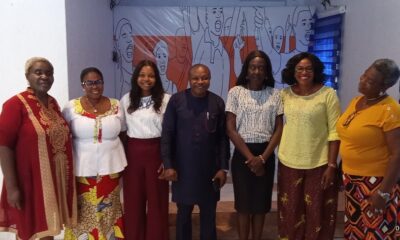Business
Procurement Process For Ibom Deep Seaport Begins
There are indications that the construction of the Ibom Deep Seaport (IDSP) will soon start following the advertisement of the Request for Qualification (RFQ) from reputable private sector port operators in partnership with the Akwa Ibom State Government and the Federal Government.
The RFQ is a major step critical towards the implementation of the IDSP project, apparently one of the most promising Public- Private Partnership (PPP) initiatives in Africa because of the several multiplier effects it will create in Nigeria and other African nations. The company disclosed on its website that: “The Akwa Ibom State Government, as part of its industrialisation plans, is very keen on implementing the Ibom Deep Seaport project as part of the Ibom Industrial City development through a PPP arrangement. The deep seaport, although a part of the industrial city, is treated as a separate project. The Ibom Deep Seaport will be owned by the Federal Government of Nigeria through the Nigeria Ports Authority in partnership with Akwa Ibom State Government and private investors. ‘’On the other hand, the Ibom Industrial City project will be solely owned by Akwa Ibom State Government. Both projects will utilise the state’s unique location to promote industrialisation in the region by developing a modern state-of-the art industrial city which will include a deep sea port. ‘’The Ibom Deep Seaport is in line with the Federal Ministry of Transportation’s (FMoT) plans to augment port capacity in Nigeria and a key component of Akwa Ibom’s economic empowerment plans. The project has the full support of the Akwa Ibom State Government, the Federal Government through the Federal Ministry of Transportation and the Nigerian Ports Authority (NPA).” “The Ibom Deep Seaport will occupy 2,565Ha of land area of the 14,517Ha available for the industrial city project.
The approximate location of the project site scaled from the British Admiralty Chart No. 1387 is Latitude 04 32’ 35″ N: Longitude 080 14’ 07″ E. and UTM coordinates 415168 m E; 502,199 m N (UTM Zone 32N).
“The project site is strategically located and accessible through major existing and planned transport infrastructure such as airport, railway lines and federal and state road networks.’’ It indicated that the Ibom Deep Sea port project is one the Federal Ministry of Transportation’s initiative to augment port capacity in Nigeria and aligns with the aggressive industrialization project being carried out by the Akwa Ibom State Government. The company stated that the seaport will form part of an integrated industrial city to help foster economic development of the country, state as well as drive economic empowerment of the citizens. It stated that this will be achieved by developing industries adjacent to the deep seaport and within the Ibom industrial city, adding that the implication is that the development of the deep sea port will be carried out in such a way that the synergies of having it within the Ibom industrial city can be fully optimised. The company stated that identified industries that will be developed in the industrial city include agriculture, petrochemicals, marine related industries, auto assembly plants, power plants, as well as real estate developments etc. ‘’The design of the Ibom Deep Seaport has provided an additional 1,565Ha of land area for future expansion of the port taking cognizance of projected growth in cargo volumes.
Business
MWUN Backs Nigeria’s Bid For IMO’s Category C Seat
Business
Food Security: FG To Review Nigerian Agric laws
Business
Okpebholo Charges Committee To End Herders, Farmers Clash In Edo … Inaugurates Boundary Committee
-
Rivers3 days ago
Okrika SOLAD Charges Students On Involvement In Drugs, Others
-
Rivers3 days ago
Rivers State University Introduces SponsorsLink To Address Communication Gap
-
News3 days ago
FG Restates Commitment To Improve Rural Roads, Markets, Others
-

 Politics3 days ago
Politics3 days agoINEC Denies Registering New Political Parties
-
Sports3 days ago
Ekiti Honour Contingents On National AGILE Games’ Feats
-

 Nation3 days ago
Nation3 days agoNGOs Urge RSG To Prioritise Child Protection Funding
-
Politics3 days ago
LG Autonomy: ICPC Hails S’Court Decision, Decries Councils’ Funds Misuse
-

 Editorial3 days ago
Editorial3 days agoResponding To Herders’ Threat In Rivers

